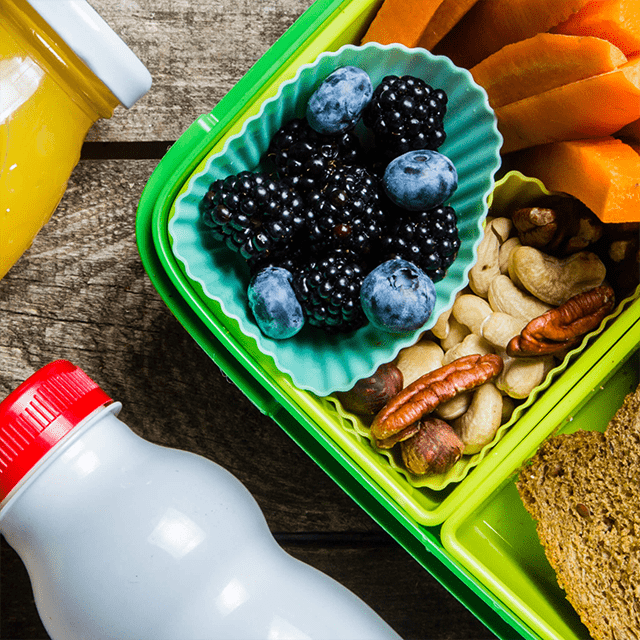¡Los hábitos alimentarios saludables son esenciales para todos, incluidos los niños!
En este blog, hablaremos sobre los beneficios de la alimentación saludable para niños, y destacaremos cómo la buena nutrición afecta su salud física, emocional y mental. También exploraremos algunas medidas prácticas que los padres pueden tomar para fomentar hábitos alimentarios saludables.
¡Profundicemos! 🍴
Según los Centros para el Control y la Prevención de Enfermedades (CDC), los hábitos alimentarios saludables benefician a los niños y adultos de manera similar. Cuando le enseña a su hijo hábitos alimentarios saludables desde la infancia, le inculca el hábito de comer sano de por vida.
Por qué es importante la alimentación saludable
Una buena nutrición es vital para el crecimiento y el desarrollo de los niños. Una alimentación saludable aporta a los niños los nutrientes esenciales para su desarrollo físico y cognitivo. Una dieta equilibrada ayuda al fortalecimiento de los huesos, refuerza la inmunidad, mantiene un peso saludable y reduce el riesgo de enfermedades crónicas en etapas posteriores de la vida.
Una dieta equilibrada incluye lo siguiente:
- Proteína: pollo, huevos, frijoles, arvejas, carne o pescado
- Frutas: frescas, congeladas, enlatadas o secas
- Verduras: frescas, congeladas o enlatadas
- Granos: pan, arroz, pasta o avena
- Lácteos: leche, yogur o queso
La comida es el combustible del cuerpo y del cerebro de los niños
¡Recuérdele a su hijo que consumir alimentos saludables le permitirá crecer grande, fuerte y le brindará la energía para jugar! Una de nuestras formas favoritas de comunicar esta verdad a los niños es decirles que sus cuerpos son como máquinas eléctricas. Explíqueles que cuando se alimentan bien, su cuerpo se llena de energía para jugar, hacer deporte y para divertirse a diario.
Regulación emocional
Con frecuencia se ignora la relación entre la nutrición y el bienestar emocional. Existen investigaciones que sugieren que determinados nutrientes, como los ácidos grasos omega3, pueden influir de forma positiva en el estado de ánimo y la función cerebral de los niños. Una dieta con un alto contenido en frutas, verduras, cereales integrales y proteínas aporta nutrientes esenciales para el correcto desarrollo del cerebro, lo que mejora la concentración, la memoria y la estabilidad emocional.
Sea un buen ejemplo
Los padres cumplen una función crucial en la creación de los hábitos alimentarios de sus hijos. Si los padres le dan prioridad a los hábitos alimentarios saludables para ellos mismos y para toda la familia, es más probable que los niños también lo hagan. Intente evitar las colaciones poco saludables en su casa; esto puede ser beneficioso tanto para usted como para sus hijos.
A continuación le damos algunas ideas de colaciones saludables:
- Tallos de apio con mantequilla de frutos secos
- Manzana con mantequilla de frutos secos
- Yogur sin azúcar
- Cereal con bajo contenido de azúcar
- Zanahorias y salsa ranchera
Consuma alimentos saludables delante de sus hijos y sea prudente al momento de hacer comentarios sobre determinados alimentos en su presencia. Cuando se dé un gusto, no muestre signos de culpabilidad o remordimiento: su hijo se basa en usted para saber cómo sentirse con respecto a la comida.
Logre que comer saludable sea divertido
¡La introducción de los niños al mundo de los alimentos saludables puede ser una aventura emocionante! Involucre a sus hijos en las compras de alimentos, y permítales elegir nuevos alimentos saludables para probar. Experimente con nuevas recetas e ingredientes, y convierta la hora de comida en una experiencia interactiva.
Enseñe los tamaños de porción apropiados
La enseñanza a los niños sobre las porciones apropiadas les ayuda a desarrollar una relación saludable con la comida. Utilice señales visuales, como comparar porciones con objetos cotidianos o dividir los platos. Fomente a que su hijo tome una cantidad adecuada de comida en su primera porción y a volver por más (si aún tiene hambre) como una forma de evitar el desperdicio de comida y de permitirle comer más despacio y escuchar su cuerpo para ver si aún tiene hambre. Los niños deben reconocer la diferencia entre tener hambre, estar satisfecho o demasiado lleno.
MyPlate ofrece una variedad de recursos divertidos para enseñar a los niños sobre tamaños de porciones y alimentación saludable.

Concéntrese en la moderación
Es importante priorizar una alimentación sana, pero enseñar la moderación a los niños es igual de importante. Evite etiquetar los alimentos como “buenos” o “malos” y, en cambio, céntrese en un equilibrio. Permitirse gustos ocasionales, como galletas, helados u otros dulces, en porciones controladas ayuda a los niños a desarrollar una relación sana con la comida y evita sentimientos de privación o culpa.
Lo mismo ocurre con los líquidos. Fomente el agua como principal fuente de hidratación y reduzca al mínimo las bebidas con azúcar.
La promoción de hábitos alimentarios saludables en los niños es una inversión en su bienestar general y los prepara para un futuro saludable. Los padres pueden influir de manera significativa en la vida de sus hijos si comprenden los beneficios de una alimentación saludable y aplican medidas prácticas para fomentar los buenos hábitos.
La alimentación saludable brinda a los niños los nutrientes que necesitan para un desarrollo físico, emocional y mental óptimo.
Los padres cumplen una función crucial en formar hábitos alimentarios en sus hijos. Pueden producir un ambiente alimentario positivo al predicar con el ejemplo, hacer que la alimentación saludable sea divertida, establecer rutinas y enseñar sobre la moderación. Hacer que los niños participen en la planificación y preparación de las comidas los empodera e inculca en ellos el amor por la comida nutritiva desde la infancia.
Tenga en cuenta que los hábitos alimentarios saludables requieren de tiempo y paciencia. Es importante celebrar las pequeñas victorias y ser comprensivo cuándo haya desafíos.





